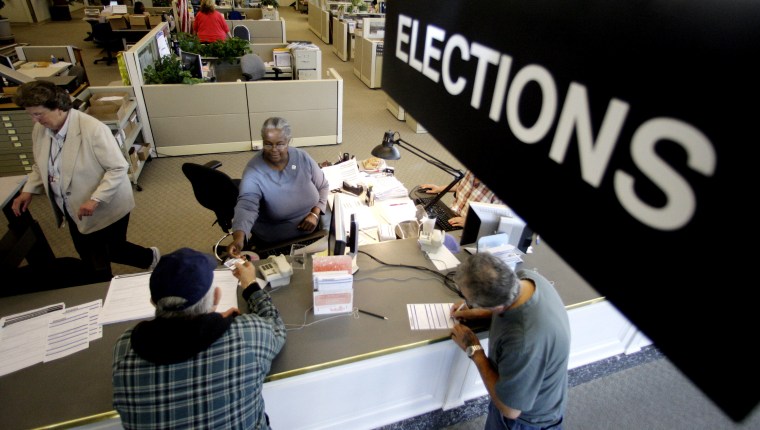Call it “motor voter" on steroids.
New legislation signed into law today in Oregon paves the way for the state to one day have close to 100% voter registration. The new law takes the federal "motor voter" law to new levels and registers a person to vote when they obtain or renew a state driver's license or ID -- and it's partially retroactive.
The law dictates that once residents interact with the state DMV -- whether to get a license or ID for the first time, or renew an existing one -- they’ll become registered to vote if they aren’t already. The registration will be provisional for 21 days, during which time applicants will be notified of their new status and be given a chance to become affiliated with a political party or to opt-out of the voting process altogether. In essence, Oregon will now be the first state to approach voting with an “opt-out” mindset, as opposed to “opt-in.”
The law will be a personal victory for Gov. Kate Brown, who came into office four weeks ago following the resignation of Gov. John Kitzhaber amid scandal. Brown, a Democrat, submitted the legislation at the beginning of the state’s 2015 legislative session while she was serving as secretary of state.
RELATED: Kate Brown becomes country’s first bisexual governor
"A couple of legislative sessions ago, we realized that thousands of Oregonians had registered to vote after the 21-day cutoff," Brown said. "In the last general election 29,000 registration forms were submitted after the deadline and they weren't able to get a ballot."
State election officials say the new law could boost the state’s rolls by as many as 300,000 voters. Oregon currently has about 2.2 million registered voters -- and a voting population of nearly 3 million, according to the 2010 Census.
"It won't happen overnight, but over a period and prior to the 2016 election," Brown said.
The law will be retroactive to late 2013 for state residents who did business with the DMV. Residents who had interactions with the department before then and are not registered to vote will still have to sign-up either online, in-person, or through mail.
The bill, HB 2177, passed the State House in February and was given final approval by the State Senate on March 5. It was approved along party lines without a single Republican vote in support of it. The only dissenting Democratic vote came from Sen. Betsy Johnson, who was the deciding vote against a similar bill that ultimately died in 2013.
Opponents argue two main points: Transferring this particular type of data between the DMV and secretary of state’s office makes the voting system prone to ID theft, and that it will make it easier for undocumented immigrants to become registered voters.
Democrats cite several firewalls in the law’s wording, including a provision aimed at preventing the transfer of information for citizens with special “protected status,” like law enforcement and domestic violence victims. When it comes to protecting voter rolls against non-U.S. citizens, experts said the new law will help assure that only U.S. citizens are registering. Since 2009, the Oregon DMV has collected citizenship data from applicants and the state requires proof of citizenship when applying for a driver’s license. Currently, prospective voters are asked on the registration form if they’re U.S. citizens, but don’t have to provide any tangible proof.
"The argument that folks have used against the bill is that this will increase progressive or Democratic voter registration," Brown said. "If you look at Democrats and progressives, they do a good job or registering people to vote. This bill is much more agnostic. It will register people throughout the entire state. I think that's a good thing."
RELATED: Democrats want to add right to vote to the Constitution
Even without this new law, Oregon has been a leader in voter participation. In the 2014 midterm election, 53.5% of registered voters in the state cast ballots -- a particularly high number for a non-presidential year in a historically partisan state. In 2014, the state was fifth in voter turnout, behind Maine, Wisconsin, Colorado, and Alaska. All of those in the top four, except Alaska, allow for same-day voter registration. (Alaska does permit same-day registration during presidential elections.)
"People didn't fight for our right to register to vote, they fought for our right to vote," Brown said. "We want to treat our citizens as customers."
While HB 2177 is poised to increase the state's registered voters, it does not change other aspects of Oregon’s voting laws. Unregistered voters will still have to enroll 21 days before an election and same-day registration is not permitted.
